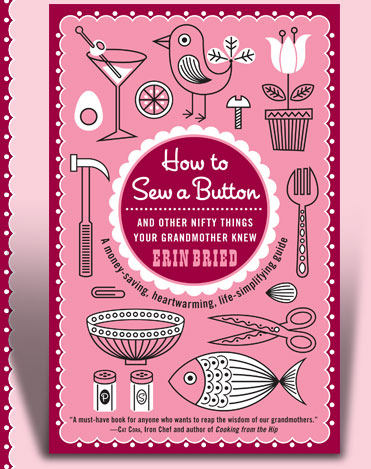Unlike apparently everyone else I know, I haven't been bitten by the royal wedding bug. I have no idea why I don't care, but I just don't. Although I will say that I've seen a few pictures of Kate Middleton's dress and she was gorgeous. That's the end of my royal wedding talk, though :)
What I have been preoccupied by the past few days, though, is cleaning. This is the first year that I've done a good, thorough spring cleaning and I have to say, I love being in my apartment right now. My reasons for spring cleaning now are that 1) I'm having some friends over for dinner tomorrow night and I wanted the place to be spotless and 2) it's the end of the semester and I felt like I needed to purge the literal junk that was leftover after I turned in final papers. So yesterday, I started working like a madwoman, cleaning everything in sight.
 The book pictured above is one of my new favorites. The author, Erin Bried, combines practical advice for how to do all kinds of tasks with anecdotes from grandmothers. The book is divided into 10 sections: cooking, gardening, cleaning, dressing, nesting, thriving, loving, saving, joining, and entertaining. I've been using it as a reference guide as I learn how to run a house on my own. For instance, in this bout of cleaning, I used one of her entries on using vinegar to clean with; commercial cleaning products make it hard for me to breathe and they make my hands peel awfully sometimes. Vinegar does not, so I now know what I'll use to clean my apartment. The only downside to vinegar is that it smells, but I combated that with burning candles, and the smell fades pretty quickly anyway.
The book pictured above is one of my new favorites. The author, Erin Bried, combines practical advice for how to do all kinds of tasks with anecdotes from grandmothers. The book is divided into 10 sections: cooking, gardening, cleaning, dressing, nesting, thriving, loving, saving, joining, and entertaining. I've been using it as a reference guide as I learn how to run a house on my own. For instance, in this bout of cleaning, I used one of her entries on using vinegar to clean with; commercial cleaning products make it hard for me to breathe and they make my hands peel awfully sometimes. Vinegar does not, so I now know what I'll use to clean my apartment. The only downside to vinegar is that it smells, but I combated that with burning candles, and the smell fades pretty quickly anyway. I would highly recommend this book for any other recent college grad who needs those kinds of basic life skills. The next portion of the book I want to tackle is gardening, since I seem to have a black thumb that I'd like to get rid of!